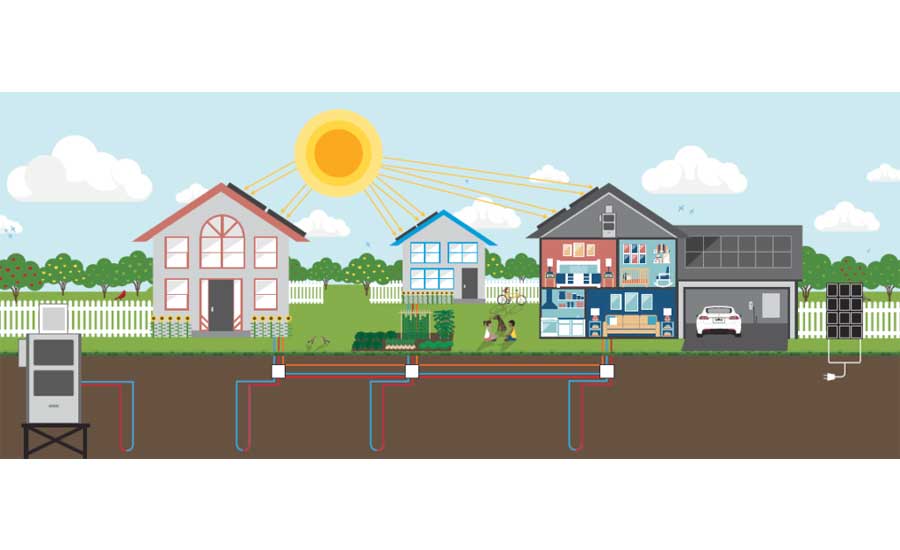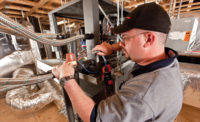Christmas came early for the geothermal industry when the latest federal stimulus bill included a long-sought extension of tax credits for geothermal installation. Existing tax credits were set at 26% throughout 2020, 22% throughout 2021, and falling to zero at the end of 2021. Now geothermal tax credits will stay at 26% for 2021 and 2022 before falling to 22% in 2023.
That’s better than the alternative, but still less than the industry had been lobbying for. Doug Dougherty, president of the Geothermal Exchange Organization (GEO), said his group had been working with members of Congress on a bill that provided a five-year extension, starting at 30% for 2021 and retroactive to 2020. The wording from that bill was included in the House version of the stimulus bill. However, Dougherty heard from staff they would never get the full five years at 30%.
Still, the three-year extension helps a lot. Dougherty explained that geothermal installation comes with a high upfront cost. The industry claims the technology pays for that cost with long-term savings, but consumers and builders often fail to see that. This makes the tax credit crucial until geothermal reaches economics of scale. When tax credits disappeared in 2017, the geothermal market collapsed.
“It buys us some time,” Dougherty said. “It allows us to grow the industry.”
Geothermal needs 15-20% of the overall HVAC market before it no longer needs that tax credit support, Dougherty said. The technology is gaining ground. Dougherty pointed to Whisper Valley, an eco-friendly development outside Austin, Texas, that provides geothermal cooling and heating to 7,500 homes.
Success at State Level, Advances at Federal Level
Prospects for geothermal are improving in part because of political action at the state level. New York State placed a moratorium on new gas hook-ups. As a result, Dougherty said some utilities are looking at the idea of installing a geothermal loop to provide heat to consumers and a steady stream of income for themselves from rental fees.
The prospects for geothermal in Washington, D.C., are also improving. Dougherty said GEO has a lot of work to do to get the more than 60 new members of the Congress up to speed on the industry. The number of elected officials concerned with environmental issues is growing on both sides of the aisle, he said. Dougherty pointed to a “Dear Colleagues” letter written by Sen. Thom Tillis, a North Carolina Republican, and co-signed by six other Republicans. The letter urged the consideration of policies that bolster jobs and innovation across the clean energy economy.
“We are beginning to see more and more people who have never weighed in on climate change issues taking an interest in that,” Dougherty said. “We’ve got a good core of geothermal heat pump supporters, both in the House and now in the Senate.”
New Administration Should Open Some Doors
Dougherty also expects a better reception at the executive level. Incoming President Joe Biden has made the environment a major part of his agenda. That’s good news for groups like GEO that struggled to get any traction with executive agencies, such as the EPA, during the Trump administration.
“I think we’ll have the door open again for us,” Dougherty said.
GEO did develop one very strong relationship in the past four years; it was with Susan Hamm, the Geothermal Technologies Office Director for the Office of Energy Efficiency and Renewable Energy. This agency had mostly focused on the use of geothermal energy from deep in the earth to generate electricity. Right out of the gate, Dougherty said, Hamm expanded her agency’s mission to include geothermal heat pumps. Hamm is expected to stay in her current role.
Dougherty said the extension of the geothermal tax credits gives hope to a lot of small businesses. He knows of one firsthand. Dougherty recently bought a new house and, of course, wanted to install a geothermal system. He hired a small firm to do the work.
The owner of that firm told Dougherty they needed to buy a new truck for the business. But he was hesitant to do so because the tax credits were going to zero at the end of 2021. Now, Dougherty said, he can buy that truck.
“The trickle-down benefit of extending the tax credits with three-year certainty allows these small businesses to make the capital improvements they need to be in stronger position to sell and install geothermal heat pumps,” Dougherty said.
“We are beginning to see more and more people who have never weighed in on climate change issues taking an interest in that. We’ve got a good core of geothermal heat pump supporters, both in the House and now in the Senate.” — Doug Dougherty



